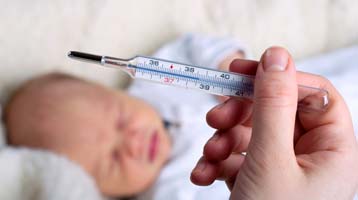What is glandular fever?
At some time in our lives, any of us may have suffered through the awful viral infection known as glandular fever without knowing it. Never, I hear you say. Well, remember that nasty sore throat when you couldn’t bear to swallow, chills then sweats, aches and pains, and the mere thought of food was just yuck! Such a flu-like illness may have been glandular fever. Yes that’s right. Glandular fever (or kissing disease, because it is transferred via saliva) is the common term used to describe an acute viral infection; its proper name is infectious mononucleosis. The virus that causes glandular fever is known as Epstein-Barr virus. Glandular fever mainly affects teens and young adults.
Glandular fever isn’t usually very serious. Most adults, who have been exposed to the Epstein-Barr virus as children, have built up antibodies and won't get it again. The complications of Glandular fever may be more serious than the disease itself.
What are some of the symptoms?
Most often children will complain of a sore throat and may have a fever. Extreme tiredness is also a common complaint and this might alert parents that there is something more than just flu lurking. Your doctor will look at the state of your child’s tonsils and pharynx, where the nasty virus likes to take up residence. If spots are found there, the doctor may suspect infectious mononucleosis (glandular fever) and recommend further tests to make sure. Like most areas of health though, even glandular fever can present in strange ways; for example, some people can be asymptomatic, in other words show no apparent signs at all.
Your medical practitioner will look for a range of signals to make a more certain diagnosis.
These (and their technical terms) include:
Enlarged lymph nodes (lymphadenopathy)
Enlarged spleen (splenomegaly)
Yellow colouring of skin and eyes (jaundice)
Blood testing is a good way to diagnose both an active infection and whether you have had the virus in the past.
Infection, timing and spread
Taking 4 to 6 weeks to develop (from time of infection with the virus) makes glandular fever a tricky little number to detect early. In addition, a person can be infectious for months and not know it. In some cases, the infectious period can last for over a year, so you can see why it is so widespread. Kissing is an obvious route of transmission, so too are items that children place in their mouths and the sharing of food.
Luckily, glandular fever tends not to be too severe in young children, often only causing very mild symptoms and sometimes none at all.
Should I keep my child at home?
Many agencies and health care professionals won’t recommend keeping an otherwise well child at home – if he or she does have the virus it’s not practical to expect a child to stay out of school or care for months on end. Of course, if you or your child is unwell and not up to going out of the house, rest is best and consult your doctor for further advice.
How can I treat it?
There is currently no cure for glandular fever, but the symptoms should pass within a few weeks. However, there are things you can do to help control your symptoms:
Fluids
It is important to drink plenty of fluids (preferably water or unsweetened fruit juice) to avoid becoming dehydrated. This will also help to relieve your symptoms of fever and sore throat. Also, avoid alcohol, as this could damage your liver, which will already be weakened from the infection.
Painkillers
Over-the-counter painkillers such as paracetamol, or non-steroidal anti-inflammatory drugs (NSAIDs) such as ibuprofen, can help relieve symptoms of pain and fever. Note though that children under 16 years old should not take aspirin. There is a small risk it could trigger a rare but serious health condition called Reye's syndrome, which affects the liver and brain.
Rest
It is important you take plenty of rest for the first two to three weeks after your glandular fever symptoms begin. However, complete bed rest is no longer recommended, as it can make the symptoms of fatigue last longer. You should gradually increase your activities as your energy levels return, but it is important to avoid activities you cannot manage comfortably.
You can return to work, college or school as soon as you feel well enough. There is little risk of spreading the infection to others as long as you follow common-sense precautions, such as not kissing other people or sharing utensils or food.
For the first month after your symptoms begin, avoid contact sports or activities that put you at risk of falling. This is because if you have a swollen spleen, it is more vulnerable to damage and a sudden knock could cause it to rupture.
Salt water
Gargling with salt water may help relieve the symptoms of a sore throat. Mix half a teaspoon of salt (2.5 g) with a quarter of a litre of water (250 ml).
If you are over 16 years old, you may find dissolving aspirin in water provides some additional benefit. Children under 16 should not take aspirin.
Antibiotics and steroids
Your doctor may prescribe antibiotics for you. Antibiotics are not effective against a viral infection such as Glandular fever, but it may be prescribed for you if you develop a secondary bacterial infection of the throat, sinuses or tonsils.
A severe swelling of your tonsils or throat may prompt your doctor to prescribe you a short course of steroids to ease the symptoms.
Lastly
Remember to ensure adequate rest. Recovery can be improved by getting lots of rest and harnessing the natural healing powers of sleep. Of course, once things begin to look up, it’s important to start to get active again but don’t over-stress the body’s coping systems. In particular, avoid heavy lifting and contact sport due to risk of rupturing the spleen.



















